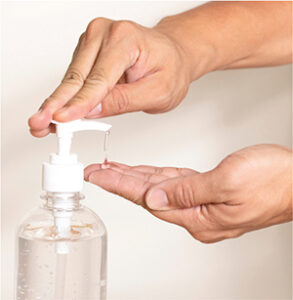Is hand sanitizer flammable? It’s a question on many people’s minds as they try to protect themselves from germs and stay healthy. With the widespread use of hand sanitizers, especially during Covid 19 period, it’s important to know the answer to this question to ensure the safety of yourself and those around you.
Yes, hand sanitizer is flammable. It is made up of a combination of alcohol, water, and other ingredients, and alcohol is a flammable substance. It is important to keep hand sanitizer away from open flames and to follow the instructions on the label when using it.
Avoid using it near heat sources, and be sure to let it dry completely before using any devices that may produce a spark, such as lighters or electrical outlets. If you are using hand sanitizer and it comes into contact with a flame, it can ignite and cause a fire.
Is hand sanitizer flammable?

Hand sanitizer is a liquid or gel that is used to reduce the number of harmful bacteria and other microorganisms on the hands. Some types of hand sanitizer are flammable, while others are not. Alcohol-based hand sanitizers are usually flammable, while non-alcohol-based sanitizers are not.
Alcohol-based hand sanitizers contain a high percentage of alcohol, usually around 60-95%. This high alcohol content makes them flammable. When alcohol-based hand sanitizers are applied to the hands and then come into contact with an open flame, they can catch fire and burn.
Non-alcohol-based hand sanitizers, on the other hand, do not contain a high percentage of alcohol and are, therefore, it is not flammable. These types of hand sanitizers are often made with plant-based or chemical agents that are not flammable.
It is important to use caution when using hand sanitizer, especially if it is alcohol-based. Keep it away from open flames and heat sources, and be sure to follow the instructions on the label for proper use.
Can hand sanitizer catch fire or ignite?
Hand sanitizer is flammable, so it can catch fire or ignite under certain conditions. It contains a high percentage of alcohol, which is a highly flammable substance. It can ignite if it comes into contact with an open flame or spark or if it is applied to a surface that is already on fire.
It is important to use hand sanitizer safely and to store it in a cool, dry place away from sources of heat or ignition. If you are using hand sanitizer, make sure to keep it away from open flames or sparks, and do not apply it to a surface that is already on fire.
Is it safe to use hand sanitizer near an open flame?
It is generally not safe to use hand sanitizer near an open flame. Hand sanitizer is flammable and can ignite or explode if it comes into contact with an open flame. This is especially true for hand sanitizers that contain a high percentage of alcohol, as they can ignite at relatively low temperatures.
Also, it is best to avoid using hand sanitizer near any source of heat or open flame, including candles, cigarettes, and stovetops. If you do need to use hand sanitizer, be sure to keep it away from open flames and heat sources and follow the manufacturer’s instructions for use.
Are all hand sanitizers flammable?
Most hand sanitizers are flammable, especially those that contain alcohol. This is because alcohol-based hand sanitizers have a high alcohol content, typically around 60-95% ethanol or isopropanol. When exposed to an open flame or other ignition sources, these products can catch fire and burn.
It is important to use caution when using alcohol-based hand sanitizers, especially around open flames or other sources of ignition. It is generally recommended to keep these products away from heat and flame and to store them in a cool, dry place.
There are some non-alcohol-based hand sanitizers available that are not flammable. These products typically use antimicrobial agents other than alcohol to kill germs and do not pose the same fire risk as alcohol-based hand sanitizers. However, these types of hand sanitizers may not be as effective at killing certain types of germs as alcohol-based products.
Generally, most hand sanitizers are flammable due to their high alcohol content, but there are some non-alcohol-based options available that are not flammable. It is important to use caution when using any type of hand sanitizer and to follow the recommended guidelines for storage and use.
What are the risks of using flammable hand sanitizer?

Using flammable hand sanitizers can pose several risks, including the risk of fire and burns. Some of the potential risks associated with using flammable hand sanitizers include the following:
- Fire risk: Alcohol-based hand sanitizers are highly flammable and can catch fire if they come into contact with an open flame or other ignition sources. This could potentially result in a fire that could cause serious injury or damage.
- Burns: If a flammable hand sanitizer catches fire, it can burn the skin, causing burns. These burns can be serious and may require medical attention.
- Explosion risk: In some cases, flammable hand sanitizers may explode if they are exposed to heat or flame, potentially causing serious injury or damage.
- Inhalation risk: If a flammable hand sanitizer catches fire, it can release harmful gases and vapors that can be inhaled, potentially causing respiratory problems or other health issues.
It is important to use caution when using flammable hand sanitizers and to follow the recommended guidelines for storage and use. This includes keeping the product away from heat and flame and storing it in a cool, dry place.
How do I properly store hand sanitizer to prevent it from catching fire?
To store hand sanitizer safely and prevent it from catching fire, you should follow these guidelines:
- Keep the hand sanitizer in a cool, dry place away from heat sources such as stoves, radiators, and direct sunlight.
- Do not store hand sanitizer near open flames or other ignition sources.
- Do not store hand sanitizer in a location where the temperature may exceed 120 degrees Fahrenheit, as this can cause the alcohol in the hand sanitizer to evaporate and increase the risk of fire.
- Keep the hand sanitizer in its original container with the cap securely tightened to prevent leaks.
- Do not transfer hand sanitizer to other containers, as this can lead to confusion about the contents and increase the risk of accidental use near an open flame.
- Keep hand sanitizer out of the reach of children and pets.
By following these guidelines, you can help prevent hand sanitizer from catching fire and ensure that it is stored safely.
What should I do if my hand sanitizer catches fire?
If your hand sanitizer catches fire, you should take the following safety measures:
- Stay calm and try not to panic.
- Do not try to extinguish the fire with water, as this can cause the alcohol in the hand sanitizer to spread and potentially increase the size of the fire.
- If the fire is small and contained, such as a hand sanitizer that is on fire in a sink or on a counter, try to smother the flames by carefully placing a lid or pot over the top of the container.
- If the fire is larger or out of control, evacuate the area and call the fire department immediately.
- Do not use an extinguisher on the fire unless you have been trained to do so and feel confident in your ability to safely use the extinguisher.
- Stay out of the area until the fire has been completely extinguished and it is safe to return.
How does the flammability of hand sanitizer compare to other household products?
The flammability of hand sanitizer is generally higher than that of other household products because it contains a high percentage of alcohol. Alcohols, particularly ethanol and isopropanol, are highly flammable and can easily ignite when they come into contact with an open flame or other ignition sources.
Other household products that are less flammable than hand sanitizer include:
- Water: Water is not flammable and can be used to extinguish fires.
- Soap: Soap is not flammable and does not pose a fire risk.
- Baking soda: Baking soda is not flammable and can be used to extinguish small fires.
- Vinegar: Vinegar is not flammable and can be used to extinguish small fires.
- Salt: Salt is not flammable and can be used to extinguish small fires.
It is important to store all household products, including hand sanitizer, safely and away from heat sources and open flames to prevent fires.
Is it safe to use hand sanitizer around electrical outlets or appliances?
It is generally not safe to use hand sanitizer near electrical outlets or appliances. This is because the alcohol in hand sanitizer is flammable and can ignite if it comes into contact with an electrical spark or other ignition sources.
If you need to use hand sanitizer near an electrical outlet or appliance, you should take the following precautions:
- Keep the hand sanitizer at least three feet away from any electrical outlets or appliances.
- Make sure that the hand sanitizer is stored in a safe location and that the cap is securely tightened to prevent leaks.
- Do not use hand sanitizer near any open flames or other ignition sources.
- Do not use hand sanitizer on or near electrical cords or plugs.
By following these precautions, you can help prevent accidents and keep yourself and others safe while using hand sanitizer.
Can hand sanitizer ignite when exposed to heat or sunlight?
Hand sanitizer is a flammable liquid, so it can ignite when it is exposed to heat or a flame. The alcohol in hand sanitizer has a low flash point, which means that it can evaporate and catch fire at relatively low temperatures.
If hand sanitizer is left in a hot car or in direct sunlight, it could potentially ignite. The risk of ignition is higher if the hand sanitizer is stored in a container that is not properly sealed or if the hand sanitizer is old or has been tampered with.
Sunlight can also potentially ignite hand sanitizer if it is left in direct sunlight for an extended period of time. The heat and UV radiation from the sun can cause the hand sanitizer to become hot enough to ignite.
It is important to store hand sanitizer in a cool, dry place, away from sources of heat or flame. It is also important to use hand sanitizer as directed and to keep it out of reach of children. If you are using hand sanitizer and it becomes hot to the touch, it is best to discard it and replace it with a new bottle.
Are there non-flammable alternatives to hand sanitizer?

There are several alternatives to hand sanitizer that are non-flammable:
- Soap and water: This is the most effective way to kill germs and is safe to use. Simply wash your hands with soap and water for at least 20 seconds, then dry them thoroughly.
- Alcohol-free hand sanitizers: These products use alternative ingredients, such as quaternary ammonium compounds, to kill germs. They may be less effective at killing certain types of germs, but they are non-flammable and safe to use.
- Hand wipes: These are moist towels that can be used to clean your hands when soap and water are not available. They are non-flammable and can be effective at killing germs, but they may not be as effective as soap and water.
- Gel hand sanitizers: Some gel hand sanitizers use a non-alcohol formula which makes them non-flammable. However, they may not be as effective at killing germs as alcohol-based sanitizers.
It’s important to note that while these alternatives are non-flammable, they may not be as effective at killing germs as alcohol-based hand sanitizers. In situations where hand hygiene is especially important, such as in a healthcare setting, alcohol-based hand sanitizers are generally recommended.
Can hand sanitizer be used as a fire starter in survival situations?
It is not recommended to use hand sanitizer as a fire starter in survival situations because it is not a reliable or safe method.
Hand sanitizer is primarily composed of alcohol or an alcohol-based solution, which makes it flammable. However, the alcohol content in hand sanitizer is usually not high enough to sustain a flame for an extended period of time, and it may burn out quickly or not ignite at all. In addition, the small size of a hand sanitizer bottle or container makes it difficult to use as a fire starter, as you would need a larger and more stable fuel source to support a fire.
There are much more reliable and safer methods of starting a fire in a survival situation, such as using a fire starter kit, matches, a fire starter rod, or natural materials like dry grass, leaves, and twigs. It is important to have a good understanding of fire-starting techniques and to practice them in a controlled environment before attempting to start a fire in a survival situation.
Precautions to take when using hand sanitizer in public places or events
When using hand sanitizer in public places or events, it is important to follow these precautions:
- Use an alcohol-based hand sanitizer that contains at least 60% alcohol.
- Apply the hand sanitizer to the palms of your hands and rub them together until the hand sanitizer is dry.
- Avoid touching your eyes, nose, or mouth after applying the hand sanitizer.
- If your hands are visibly dirty or greasy, wash your hands with soap and water instead of using hand sanitizer.
- Keep the hand sanitizer out of reach of children. Hand sanitizer can be toxic if ingested.
- If you are using hand sanitizer at an event, try to use a hand sanitizer that is in a pump bottle rather than a squeeze bottle, as this can help reduce the risk of cross-contamination.
Recommended:
Conclusion
This page answers the questions of is hand sanitizer flammable and other things you need to know. The alcohol in hand sanitizer is what makes it effective at killing germs, but it also makes it flammable. The alcohol content in hand sanitizer ranges from around 60% to 95%, with the most common alcohols being ethanol, isopropyl alcohol, and n-propanol.
All of these alcohols are flammable and can easily catch fire if they come into contact with an open flame or spark.
To reduce the risk of fire, it is important to use hand sanitizer responsibly. Do not use hand sanitizer near open flames or sources of ignition, such as cigarettes or candles. If you are using hand sanitizer in a public place, be sure to properly dispose of any wipes or tissues that may be saturated with hand sanitizer, as they can also be flammable.

